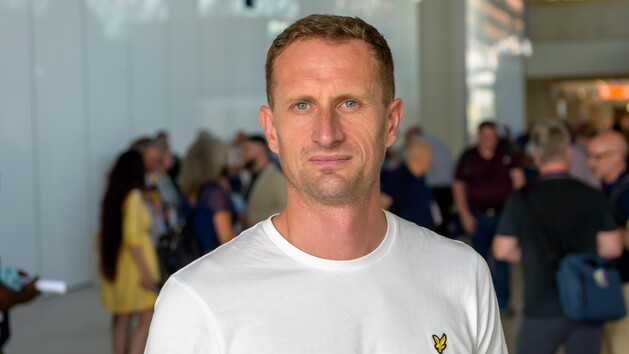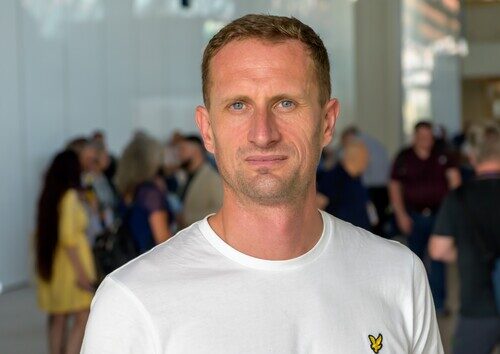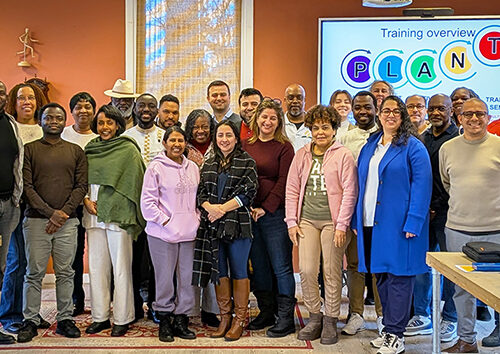29 August 2024| Belgrade, Serbia [Marcos Paseggi with tedNEWS, and Adventist Review]
As human beings, we are wired for stories, and telling ours, including our experiences of pain and trauma, can be a powerful tool for healing and redemption, said Marko Zeko, pastor of the Split Church in Croatia, 28 August. Zeko’s comments were part of a breakout presentation during the 2024 European Pastors’ Council (EPC) in Belgrade, Serbia.
The event, which is taking place August 27-31 under the theme ‘Engaged in Mission,’ has gathered more than 1,000 Adventist pastors from across the 22 countries in the Trans-European Division (TED) and regional and world church leaders to worship, learn, and connect. It included plenary sessions and scores of workshop sessions on theology, psychology, counselling, church pastoring, outreach and mission. Zeko’s presentation called participants to be aware of their own stories and to harness what he called “the redemptive power of an engaging narrative.”
The Role of Life Experiences
Storytelling is embedded in our human nature, Zeko reminded pastors. They create a connection between other people and us. In that context, our early stories, including our stories of pain and trauma, have the power of shaping who we are. They affect even the development of our brains, he said, quoting American psychiatrist Bruce D. Perry. “Our life experiences shape the way key systems in our brain organize and function,” Zeko quoted.
For Seventh-day Adventists, Zeko said, it is vital to be aware that “relationships impact our brains more than anything else — more than exercise, more than nutrition, more than religious experiences,” he shared. At the same time, our earliest life experiences are much more significant for the development of our brain than our later experiences. It is the reason psychologists agree that our earliest experiences with our primary caregivers are the most significant in shaping what we are.
Against that background, our past stories can be a fundamental feature to understanding who we are in the present. Once again, Zeko quoted Perry. “Your past is not an excuse. But it is an explanation — offering insight into the questions so many of us ask ourselves: Why do I behave the way I behave? Why do I feel the way I do? For me, there is no doubt that our strengths, our vulnerabilities, and unique responses are an expression of what happened to us.”

Integration vs. Fragmentation
Zeko explained that when, as Adventists, read in Romans 8:22 about the groaning of creation, we usually think of the signs of the second coming. But the Bible verse also talks about the disintegration, the fragmentation that has resulted from sin, which affects families and churches, and about who is the father of that disintegration. We should ask ourselves, “How has this disintegration affected my marriage, family, church, and the stories that shape me?” He added, “I believe the time has come to become more aware of what has happened to God’s creation, and not only what is wrong with God’s creation.”
In a pastoral context, pastors often must focus on what’s wrong with God’s creation (church discipline, for instance.) However, pastors and other people of faith would benefit from framing the discussion on what happened to God’s creation. “Why does a person act this way? What has happened in their experience to inform their decisions and behaviour?” So, pastors would be more willing to find out and listen to people’s life stories, asking them, what happened to you? “It is a hard thing to do and requires more time, effort, and empathy… more love for people,” Zeko said.
This approach can help pastors and other leaders to better understand how people in church act, how they process their theology — how they understand God —. “The more people in our churches are disintegrated, the more they will cling to a theology that is not 100% the gospel,” he suggested.
Zeko shared the case of a mature lady interested in the Adventist message who followed Bible studies but can’t still decide to surrender to God fully. “Her past life experiences were so hard that now she is struggling with two basic questions, ‘Am I safe? Am I loved?’ Because she can’t answer those questions positively, she finds it hard to make a decision,” Zeko shared.

The Power of Our Past Story
In the next part of his presentation, Zeko called Adventist pastors, leaders, and members to embrace their past stories, including their trauma experiences, to use them as a tool for growth and connection to others. He cautioned it is a long, slow, and painstaking process but a rewarding one. “It is a process that requires building tolerance for emotional discomfort,” he said. “When I confronted my trauma, my childhood experiences in group therapy, it felt so unpleasant. I wanted to flee,” Zeko acknowledged.
Zeko also called pastors to know that conversion does not mean all our past issues are solved. Using his own life story, he shared how even after he converted and accepted God in his life, he was not aware of how much historical and intergenerational trauma was affecting his experience. In his case, he required therapy, the support of his wife, and other people to become more aware of his own story, and it informed what he was and how he acted.
He emphasized, “We are vulnerable, we are wounded, but we are beautiful at the same time. And when you enter your story, your trauma… you experience God accept you more and more.”
Pastoral Implications
This new awareness will inform and impact even how an Adventist pastor approaches his role, Zeko said. He quoted professor and theologian Henri Nouwen, who wrote that “the Christian leader of the future is called to be completely irrelevant and to stand in this world with nothing to offer but his or her own vulnerable self. That is the way Jesus came to reveal God’s love… The mystery of ministry is that we have been chosen to make our own limited and very conditional love the gateway for the unlimited and unconditional love of God.”
In the pastoral practice, Zeko called Adventist ministers to integrate people’s life stories in their churches, to “engaging the lived stories of people and bringing those stories into dialogue with their biblical narratives,” he said, quoting consultants Alan Roxburgh and Fred Romanuk. Zeko shared how he organized two small parallel groups for storytelling as part of a leadership project. “One group consisted of church members and the other was formed with non-members,” he shared. “Church members had a harder time connecting with their past and their stories,” Zeko reported.
This has strong implications for pastoral practice, Zeko emphasized. “Imagine what would happen if in our churches, besides engaging with the biblical text, we would start in small confidential groups sharing our life stories,” he said. “And if you think it’s too difficult to implement, begin at least to reflect on your life story. For a start, begin to listen to your spouse… In my story, God used my wife to reach out to me and save me from my disintegration.”
The objective is, Zeko said, to reach a place where we may not only find ourselves but also find God. “The ultimate goal is finding true shalom,” he said.
[Photos: Tor Tjeransen] / Adventist Media Exchange (CC BY 4.0)]



